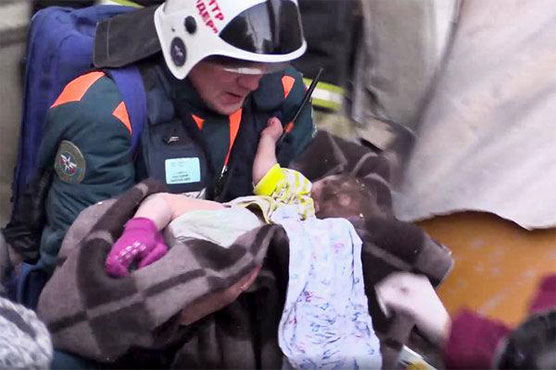Rescuers pull 'miracle' baby from collapsed Russian building

Baby was recovered from the ruins of a building where he spent the night in sub-zero temperatures.
MOSCOW (AFP) - Russian rescuers Tuesday pulled a baby boy hurt but alive from the ruins of an apartment building where he spent the night in sub-zero temperatures after a gas explosion that killed at least nine people.
With dozens of inhabitants still missing, authorities identified the 10-month-old boy as Ivan Fokine, and said he had been reunited in hospital with his mother, who also survived the ordeal.
"A New Year s miracle has occurred!" Russia s emergencies ministry said in a statement that named the young survivor of Monday s tragedy in the industrial city of Magnitogorsk, nearly 1,700 kilometres (1,050 miles) east of Moscow in the Ural mountains.
"The baby s mother is alive. She has gone to the hospital and recognised her son," it added.
The boy was taken to hospital in Moscow in an "extremely serious" condition, with severe frostbite to his limbs, a head injury and multiple leg fractures, the health ministry said.
He will be transferred to a hospital in Moscow for specialised treatment.
Emergency services posted a video of rescuers slowly prising apart concrete panels of the collapsed nine-storey building s edifice and pulling out the baby, who can be seen blinking, before running with him wrapped in a blanket to an ambulance.
Fokine was found after rescuers had paused a search for survivors for fear that the rest of the block could come tumbling down.
"The rescuers heard crying," Chelyabinsk regional governor Boris Dubrovsky wrote on the Telegram messenger service.
"The baby was saved by being in a cradle and warmly wrapped up."
Fokine survived temperatures that fell overnight to around minus 27 degrees Celsius (minus 17 degrees Fahrenheit), the TASS news agency reported.
The Soviet-era apartment block had been home to about 1,100 people.
The blast destroyed 35 apartments and damaged 10 more, according to authorities. Residents left homeless are being housed in a nearby school.
Nine people have been confirmed dead, all of them adults, according to the emergencies ministry.
Six people were found alive, among them a 13-year-old boy, and 32 remain unaccounted for.
Battling freezing temperatures, rescuers had worked throughout the night on New Year s Eve, combing through piles of mangled concrete and metal and trying to stabilise what remains of the walls.
The regional government announced a day of mourning for January 2, with flags lowered and entertainment events cancelled in a country where New Year s Eve celebrations are an annual highlight.
President Vladimir Putin rushed to the scene on Monday.
"It is in the character of our people, despite New Year s festivities, to remember among them a 13-year-old boy, to think of the dead and wounded at this moment," a grim-looking Putin said.
On Tuesday, the president called the emergency services to thank them for their efforts, the Kremlin said.
"I went out to have a cigarette at quarter-to-six," a local man told Russian television. "There was a blast and a wave of fire... then people started running out."
Other witnesses said the explosion was strong enough to shatter the windows of nearby buildings.
"I woke up and felt myself falling. The walls were gone. My mother was screaming and my son had been buried," said another witness.
Russian authorities said Tuesday that no trace of explosives had been found in the rubble so far, as rumours circulated in local media of a possible terror link.
The fears were fuelled by a gas explosion in a minibus elsewhere in Magnitogorsk that killed three people.
No link has been found between the two explosions, the authorities said.
Located in the mineral-rich southern Urals region, Magnitogorsk, with a population of more than 400,000 people, is home to one of the country s largest steel producers.
Investigators have opened a criminal probe into the accident, which the FSB security service said was the result of a gas explosion.
Such explosions are relatively common in Russia, where much of the infrastructure dates back to the Soviet era and safety requirements are often ignored.

